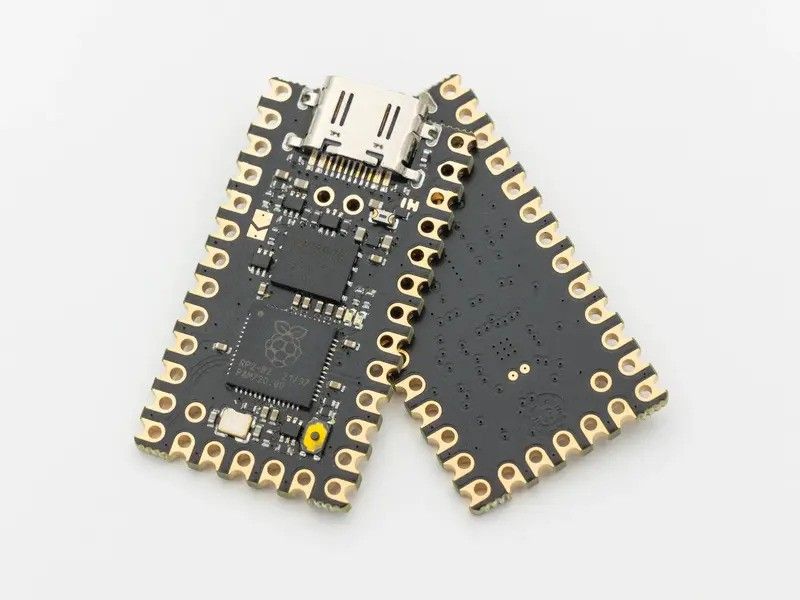
Helios by 0xCB
The 0xCB Helios is our Elite-C compatible MicroController, based on the high-performance and affordable RP2040.
It’s a drop-in replacement for legacy ProMicro boards.
Technical details
- Powerful RP2040 32-bit Cortex M0+ dual core running at 133 MHz and 264kB SRAM.
- 16MB/128Mb QSPI FLASH chip for storing files and code
- Only 3.16 mm thick thanks to a mid-mounted USB-C port
- 3.3V 500mA LDO, PTC fuse and ESD protection chip
- Elite-C, Pro Micro, SparkFun Pro Micro RP2040, and nice!Nano compatible pinout (follows the BastardKb standard)
- 8 extra I/O pins: (GP12-GP16) added along the bottom edge, (GP10-GP11) at the top and a 5V level shifted pin to drive RGB LEDs for example (GP25)
- 25 available digital pins for a maximum of 13x12 = 156 switches (using a standard matrix)
- Default off red power LED (selectable via a jumper on the left side)
- blue user LED on pin GP17
- 4 pins configurable as analog inputs
- USB D+/D- broken out for use with an external USB socket/daughterboard
- USB VBUS detection on GPIO19 for split keyboard side detection
- UF2 bootloader for drag & drop programming via your file manager
- easy to use and backward compatible Single button boot and reset circuit push to reset and hold >500ms to enter bootloader (legacy boards with reset buttons will continue to work!)
- RAW / VBUS output, for powering RGB LEDs or other 5 V devices. The jumper on top lets you skip over the 500 mA fuse and Schottky diode, for up to 3A from USB ports.
- USB-C connector lets you access built-in ROM USB bootloader and serial port debugging
Purchase
Contribute
Have some info to add for this board? Edit the source for this page here.
CircuitPython 10.1.3
This is the latest stable release of CircuitPython that will work with the Helios. Use this release if you are new to CircuitPython.
Modules included in this download
_asyncio _bleio _bleio (HCI co-processor) _pixelmap adafruit_bus_device adafruit_pixelbuf aesio alarm analogbufio analogio array atexit audiobusio audiocore audiomixer audiomp3 audiopwmio binascii bitbangio bitmapfilter bitmaptools bitops board builtins builtins.pow3 busdisplay busio busio.SPI busio.UART codeop collections countio digitalio displayio epaperdisplay errno floppyio fontio fourwire framebufferio getpass gifio hashlib i2cdisplaybus i2cioexpander i2ctarget imagecapture io jpegio json keypad keypad.KeyMatrix keypad.Keys keypad.ShiftRegisterKeys keypad_demux keypad_demux.DemuxKeyMatrix locale lvfontio math memorymap microcontroller msgpack neopixel_write nvm onewireio os os.getenv paralleldisplaybus pulseio pwmio qrio rainbowio random re rgbmatrix rotaryio rp2pio rtc sdcardio select sharpdisplay storage struct supervisor synthio sys terminalio tilepalettemapper time touchio traceback ulab usb usb_cdc usb_hid usb_host usb_midi usb_video vectorio warnings watchdog zlibFeatures: USB-C, Breadboard-Friendly
CircuitPython 10.2.0-alpha.1
This is the latest development release of CircuitPython that will work with the Helios.
Alpha development releases are early releases. They are unfinished, are likely to have bugs, and the features they provide may change. Beta releases may have some bugs and unfinished features, but should be suitable for many uses. A Release Candidate (rc) release is considered done and will become the next stable release, assuming no further issues are found.
Please try alpha, beta, and rc releases if you are able. Your testing is invaluable: it helps us uncover and find issues quickly.
Release Notes for 10.2.0-alpha.1
Modules included in this download
_asyncio _bleio _bleio (HCI co-processor) _pixelmap adafruit_bus_device adafruit_pixelbuf aesio alarm analogbufio analogio array atexit audiobusio audiocore audiomixer audiomp3 audiopwmio binascii bitbangio bitmapfilter bitmaptools bitops board builtins builtins.pow3 busdisplay busio busio.SPI busio.UART codeop collections countio digitalio displayio epaperdisplay errno floppyio fontio fourwire framebufferio getpass gifio hashlib i2cdisplaybus i2cioexpander i2ctarget imagecapture io jpegio json keypad keypad.KeyMatrix keypad.Keys keypad.ShiftRegisterKeys keypad_demux keypad_demux.DemuxKeyMatrix locale lvfontio math memorymap microcontroller msgpack neopixel_write nvm onewireio os os.getenv paralleldisplaybus pulseio pwmio qrio rainbowio random re rgbmatrix rotaryio rp2pio rtc sdcardio select sharpdisplay storage struct supervisor supervisor.get_setting synthio sys terminalio tilepalettemapper time touchio traceback ulab usb usb_cdc usb_hid usb_host usb_midi usb_video vectorio warnings watchdog zlibFeatures: USB-C, Breadboard-Friendly
Absolute Newest
Every time we commit new code to CircuitPython we automatically build binaries for each board and language. The binaries are stored on Amazon S3, organized by board, and then by language. These releases are even newer than the development release listed above. Try them if you want the absolute latest and are feeling daring or want to see if a problem has been fixed.
Previous Versions of CircuitPython
All previous releases of CircuitPython are available for download from Amazon S3 through the button below. For very old releases, look in the OLD/ folder for each board. Release notes for each release are available at GitHub button below.
Older releases are useful for testing if you something appears to be broken in a newer release but used to work, or if you have older code that depends on features only available in an older release. Otherwise we recommend using the latest stable release.
